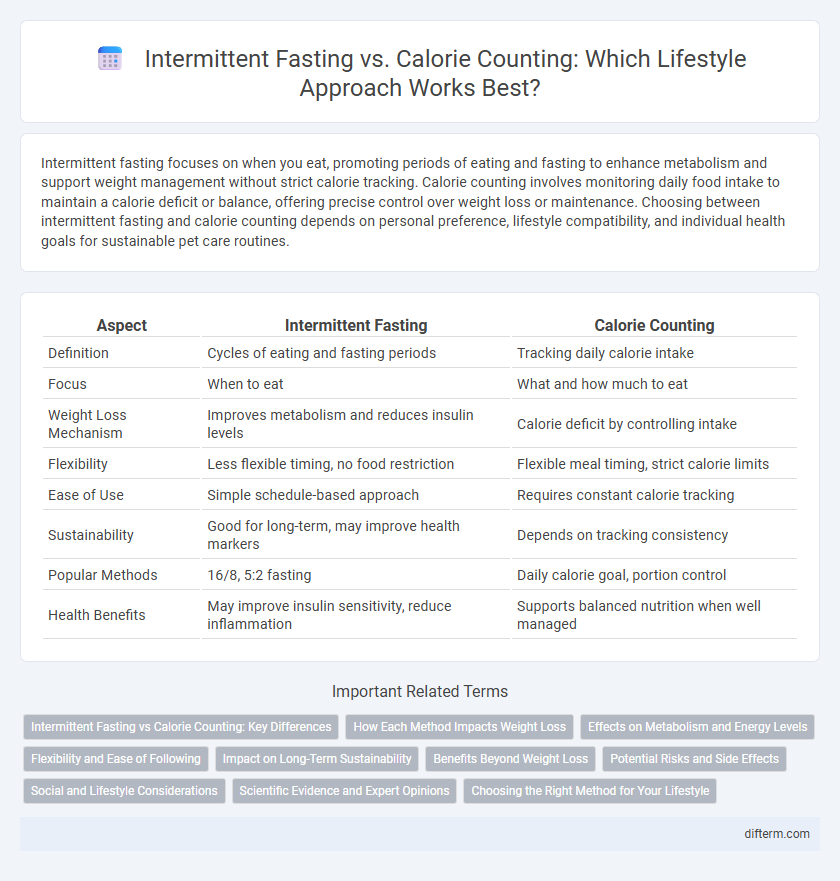Intermittent fasting focuses on when you eat, promoting periods of eating and fasting to enhance metabolism and support weight management without strict calorie tracking. Calorie counting involves monitoring daily food intake to maintain a calorie deficit or balance, offering precise control over weight loss or maintenance. Choosing between intermittent fasting and calorie counting depends on personal preference, lifestyle compatibility, and individual health goals for sustainable pet care routines.
Table of Comparison
| Aspect | Intermittent Fasting | Calorie Counting |
|---|---|---|
| Definition | Cycles of eating and fasting periods | Tracking daily calorie intake |
| Focus | When to eat | What and how much to eat |
| Weight Loss Mechanism | Improves metabolism and reduces insulin levels | Calorie deficit by controlling intake |
| Flexibility | Less flexible timing, no food restriction | Flexible meal timing, strict calorie limits |
| Ease of Use | Simple schedule-based approach | Requires constant calorie tracking |
| Sustainability | Good for long-term, may improve health markers | Depends on tracking consistency |
| Popular Methods | 16/8, 5:2 fasting | Daily calorie goal, portion control |
| Health Benefits | May improve insulin sensitivity, reduce inflammation | Supports balanced nutrition when well managed |
Intermittent Fasting vs Calorie Counting: Key Differences
Intermittent fasting centers on cycling between periods of eating and fasting, promoting metabolic health and fat loss without strict calorie tracking. Calorie counting requires monitoring daily caloric intake to create a deficit for weight loss or maintenance, demanding precise portion measurement and food logging. The key difference lies in intermittent fasting's focus on timing and metabolic rhythms, while calorie counting emphasizes quantitative energy balance control.
How Each Method Impacts Weight Loss
Intermittent fasting promotes weight loss by regulating insulin levels and enhancing fat oxidation during fasting periods, often leading to a reduction in overall calorie intake without constant tracking. Calorie counting directly controls energy balance by monitoring daily intake versus expenditure, providing precise data to create a caloric deficit essential for weight loss. Both methods can be effective, but intermittent fasting may offer metabolic benefits beyond simple calorie restriction, while calorie counting emphasizes detailed nutritional awareness.
Effects on Metabolism and Energy Levels
Intermittent fasting boosts metabolic rate by increasing norepinephrine levels, enhancing fat burning and energy efficiency, while calorie counting primarily focuses on reducing calorie intake without directly influencing metabolism. Studies show intermittent fasting can improve insulin sensitivity and mitochondrial function, leading to more stable energy levels throughout the day. In contrast, calorie counting may result in energy fluctuations due to inconsistent nutrient timing and lower basal metabolic rate over time.
Flexibility and Ease of Following
Intermittent fasting offers greater flexibility by allowing individuals to eat within specific time windows without strict calorie tracking, making it easier to follow for those who prefer less monitoring. Calorie counting requires detailed tracking of every meal, which can be time-consuming and overwhelming but provides precise control over intake. Many find intermittent fasting simpler to incorporate into daily routines, promoting adherence and long-term lifestyle changes.
Impact on Long-Term Sustainability
Intermittent fasting promotes long-term sustainability by simplifying meal timing and reducing decision fatigue, often leading to more consistent adherence compared to calorie counting. Calorie counting requires meticulous tracking and can cause burnout, which may reduce its effectiveness over extended periods. Studies show intermittent fasting enhances metabolic health markers, supporting sustained lifestyle changes without constant calorie monitoring.
Benefits Beyond Weight Loss
Intermittent fasting enhances metabolic health by improving insulin sensitivity and promoting cellular autophagy, which supports longevity and reduces inflammation. Calorie counting helps establish mindful eating habits, leading to better nutritional balance and sustained energy levels. Both approaches contribute to mental clarity and hormone regulation beyond mere weight management.
Potential Risks and Side Effects
Intermittent fasting may lead to potential risks such as nutrient deficiencies, fatigue, and irritability due to prolonged periods without food, especially if not properly managed. Calorie counting can cause mental stress, obsession with food, and nutritional imbalance if daily calorie targets are inaccurately set or followed rigidly. Both methods require careful monitoring to avoid negative impacts on metabolism, hormonal balance, and overall well-being.
Social and Lifestyle Considerations
Intermittent fasting fosters social flexibility by aligning eating windows with social events, reducing the need for constant calorie tracking during gatherings. Calorie counting requires meticulous monitoring, which can disrupt spontaneous meals and create social anxiety around food choices. Both approaches demand lifestyle adjustments, but intermittent fasting often integrates more seamlessly into social rituals without extensive dietary calculations.
Scientific Evidence and Expert Opinions
Scientific evidence shows that both intermittent fasting and calorie counting effectively promote weight loss and improve metabolic health, with intermittent fasting enhancing insulin sensitivity and reducing inflammation in some studies. Expert opinions emphasize that individual preferences, lifestyle compatibility, and long-term adherence are crucial for success, as calorie counting offers flexibility while intermittent fasting may simplify eating patterns. Research indicates combining these approaches can optimize results by leveraging metabolic benefits and sustainable calorie control.
Choosing the Right Method for Your Lifestyle
Intermittent fasting simplifies meal timing by restricting eating windows, making it ideal for individuals with busy schedules seeking metabolic benefits and improved insulin sensitivity. Calorie counting offers precise control over daily energy intake, preferred by those who value flexibility in food choices and detailed tracking for weight management. Selecting the right method depends on aligning your daily routine, dietary preferences, and health objectives for sustainable lifestyle integration.
intermittent fasting vs calorie counting Infographic

 difterm.com
difterm.com